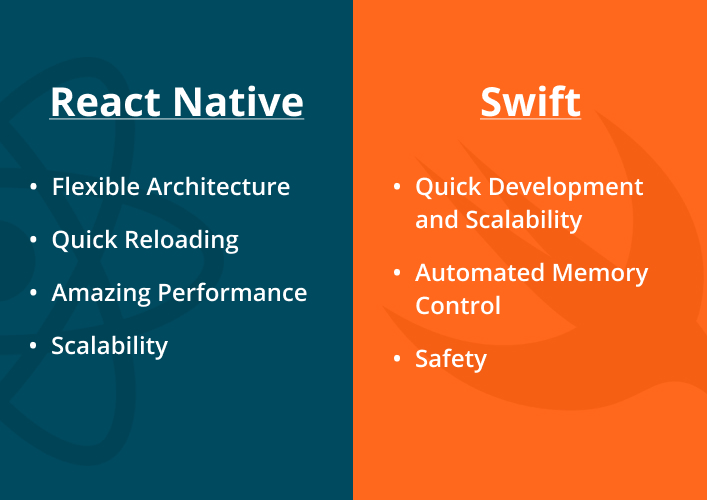React Native vs Swift – Introduction
Swift, well-known for its practical capabilities, is one of the greatest programming languages to employ for creating programs that operate on the Apple platform, including iOS, WatchOS, Mac, and TVOS. Developers will find coding easier because of its easily understandable syntax and interactive programming interface. Nonetheless, Swift frequently comes with sophisticated capabilities that simplify the process of creating cutting-edge programs. Because Swift coding prioritizes security, applications are processed quickly and securely.
React Native vs Swift – Benefits

Flexible Architecture
React Native‘s flexible architecture allows you to divide your program’s many features into flexible modules. This makes updates seamless, boosts flexibility, and enhances coordination. Similar to web APIs, it facilitates the release of app updates for developers and promotes module reuse. Additionally, it increases efficiency and permits code reuse.
Quick Reloading
Developers may see changes they make to the app’s code instantly in a preview window thanks to the quick reloading capability. Thus, the creation of apps is sped up by this fast feedback, which also facilitates quick modifications and adjustments.
Amazing Performance
Because it leverages native controls and modules, it produces effective and seamless applications. It makes use of Native APIs to create distinct threads after accessing the native components of an OS. As a result, the performance is exceptional.
Scalability
Existing apps may have new features added to them without having to be completely rewritten thanks to React Native. The ability to add UI components to an already-existing app allows developers to easily and affordably increase its functionality. Furthermore, React Native facilitates easy app updates. With over-the-air (OTA) updates, there is no need to set up a distinct procedure for every upgrade. Updates may be downloaded more quickly and easily, and you can avoid even going to the app store.
On the other hand, let’s discuss the advantages that Swift offers. Keep in mind that you cannot develop cross-platform apps using Swift. It is only for native iOS development.
Quick Development and Scalability
Swift’s simple syntax and straightforward language style make development faster. Your app will be created more quickly since you spend less time writing code. Its Automatic Reference Counting function saves a lot of time and effectively manages memory use. This ensures seamless app performance and saves you important development time. Furthermore, developers may easily expand your app and add new features. This allows developers the flexibility to alter their apps in response to changing user demands.
Automated Memory Control
Swift’s ARC functionality automatically controls memory. Thus, memory may be used effectively without compromising performance. Swift therefore guarantees efficient memory management for apps. Furthermore, Swift app development frameworks use flexible libraries and little memory to manage resources in an intelligent manner. It streamlines and expedites the development process by only using libraries when necessary.
Safety
Swift prioritizes performance enhancements and safety, outperforming Objective-C by 40%. Additionally, it has a robust error-handling mechanism and an intuitive typing system to lower the risk of crashes in production applications. Swift app development frameworks are cloud-based platforms that can manage and facilitate work on both the front end and back end. It facilitates smoother and faster app development.
React Native vs Swift – Conclusion
Lastly in React Native vs Swift, to develop cross-platform apps you should choose React Native as the app development framework because Swift can be used to develop native iOS only. Furthermore, compared to Swift the stability of React Native is less and the UI is native-like, not completely native. In case, you develop an iOS app in React Native, the performance would be lower than Swift.
However, the development cost of developing an app in React Native is lower compared to Swift. Some of the popular apps developed using React Native are Facebook, Tesla, Wix, Flipkart, Skype, Instagram, etc. On the other hand, Swift was used to develop user-engaging apps like Airbnb, WhatsApp, Slack, LinkedIn, etc.
FAQs
In React Native vs Swift, which is better?
What are the key advantages of React Native?
Large Developer Community: Access to a vast community of JavaScript and React developers.
Hot Reloading: Allows real-time code changes without restarting the app.
What are the strengths of Swift in comparison to React Native?
Access to Latest Features: Swift developers have immediate access to new iOS features.
Full Native Experience: Swift provides a more native look and feel for iOS applications.
Is React Native suitable for complex applications?
What are the potential challenges of using React Native?
Limited Access to Native APIs: In some cases, direct access to certain device features may be limited compared to native development.
Ravi Bhojani is the Chief Marketing Officer (CMO) at Alian Software, where he spearheads the company’s marketing strategies and drives its brand presence in the competitive IT services landscape. With over a decade of experience in the technology and marketing sectors, Ravi has consistently demonstrated his ability to blend innovative marketing techniques with deep industry knowledge to deliver outstanding results.